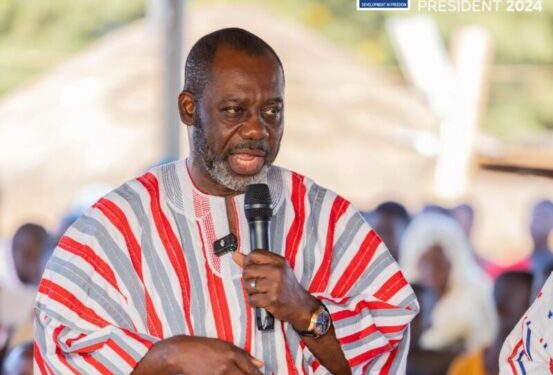Dr. Matthew Opoku Prempeh, popularly known as NAPO, says his path to political leadership is not the result of mere ambition, but rather the product of a deeply rooted sense of duty cultivated from childhood.
Speaking on JoyNews’ Personality Profile with Emefa Adeti on July 17, the former Manhyia South MP and running mate to the NPP flagbearer said he was brought up to sit with decision makers, not just follow them.
“I would say that is how I was brought up,” he declared. “I was brought up in a very politically aware family with a history of decades of partisan politics or active political life.”
According to NAPO, his upbringing instilled in him more than a passing interest in governance. From an early age, he was conditioned to value impact, service, and leadership.
“I was brought up to cherish one thing, public service, and not only public service, but bringing value through public service and for public service, meaning you just don’t participate. You participate in terms of regular impact.”
He stressed that the expectations placed on him went beyond symbolic involvement. It was about proving himself, demonstrating his ability to sit and engage at the highest levels of decision-making.
“That is how I was brought up, brought up to prove myself that I can sit at the table with decision makers, and not only the elderly, but a true decision maker.”
The influence came not just from his immediate household, but from a network of older relatives—men whose children were far older than he was. Yet NAPO served them diligently, absorbing their values and vision.
“So brought up by grand uncles and uncles far older than myself, whose children were far older than me, and I served all of them, so that’s how I was brought up.”
Public service, he said, was etched into his consciousness so deeply that it became the measure for all his associations and decisions, even as a child.
“So me growing up having public service has been a duty that has been imprinted in my heart, mind, and everything I do, so even deciding to belong to which associations growing up were all the associations that brought public service to the fore.”
He rattled off the list: Boy Scouts, altar boy duties, the Red Cross. Each step was a deliberate preparation for a life dedicated to service.
“Like joining Boy Scouts at a very early age, be an altar boy. Not only that, joining the Red Cross Society, going to do medicine and public service.”
To NAPO, public service is not measured by the size of the act, but by the depth of its impact. Whether saving a life in a surgical room or shaping policy for a nation, the ethos remains the same.
“The only difference is that some public service duties are very, very small, personal, but really impactful, and some are large and maybe impactful.”
He drew a vivid contrast between the intimate work of a doctor and the sweeping reach of political leadership.
“So being a doctor, you are serving one person at a time, and it could be very, very impactful for somebody who needs surgery, who is dying in agony, and you go in and you repair a strangled hernia or a rotten appendix or something, and you relieve his frustration. He sleeps well, and it brings a lot of joy to your heart and everything.”
But for him, politics offers the potential for even broader transformation.
“It’s limited, because when you put it around being a politician with making decisions that are life changing for suites of the society, probably forever.”
That, he says, is the vision he grew up admiring and now lives.
“So this is just a public service ethos that was looking up.”







